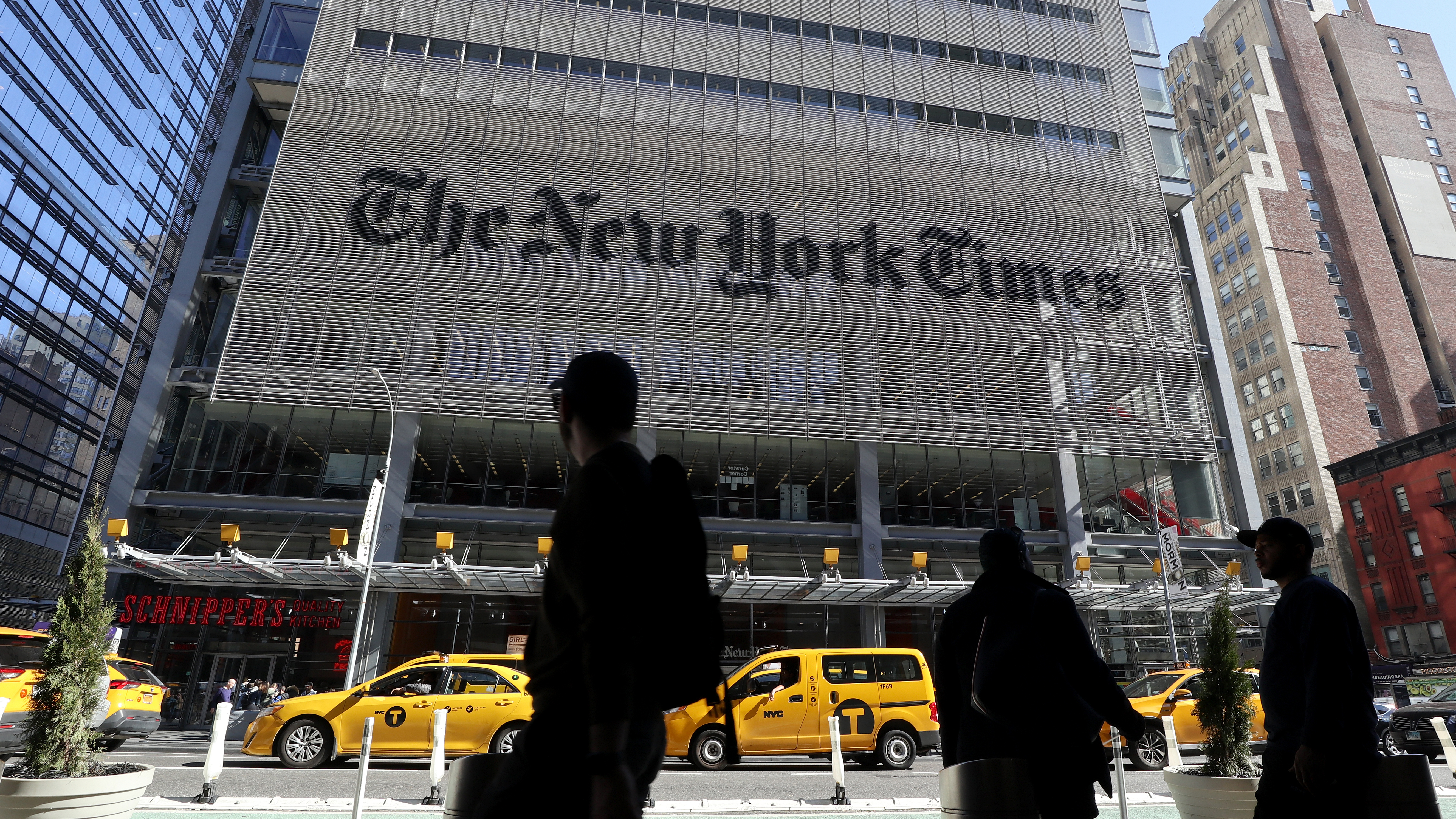
People walk along 8th Avenue in front of the New York Times headquarters in New York City, U.S., March 9, 2020. /Getty
People walk along 8th Avenue in front of the New York Times headquarters in New York City, U.S., March 9, 2020. /Getty
Editor's note: Stephen Ndegwa is a Nairobi-based communication expert, scholar and lecturer at the United States International University-Africa, author and international affairs columnist. The article reflects the author's opinions and not necessarily the views of CGTN.
That the West is fast losing clout geopolitically is almost a foregone conclusion. Either by default or by design, or both, the flow of information from the East has become unstoppable, gradually replacing the hitherto hegemony of the Western laden narratives in international media channels.
Placing China at the center of this "threat," is quite flattering because the antagonists would be least bothered if the impact is negligible. The panic that has gripped Western media is evident in an article published in the New York Times on May 9 by Ben Smith, titled "When Covid Hit, China Was Ready to Tell Its Version of the Story." Further, Smith says that "China has inserted money, power and perspective into the media in almost every country in the world."
In an almost 2,000-word piece fraught with contradictions and inaccuracies, the writer accuses China of using its money and power to create an alternative to a global news media dominated by outlets like the BBC and CNN. Really, Smith betrayed the motivation behind his bashing of Chinese media. It shows the prevailing mindset that prevails in the Western sector that they have a monopoly of ideas and their world view is more accurate than any other.
You would hardly expect Western media houses to cry wolf regarding China's growing global media presence and influence, particularly in the developing world. Moreover, as supposed guardians and champions of freedom of expression, you would assume that Western media would gladly welcome the diversity of thought that China is bringing into the picture.
The spirit of the article was also against the theme of this year's World Press Freedom Day – Information as a Public Good. It was very insincere of the Western media to hype the annual May 3 occasion and then revert to its default settings by preaching exclusionism and undermining views that do not fit a certain mold.

A man wearing a mask reads the newspaper while sitting in Bryant Park in New York City, August 7, 2020. /Getty
A man wearing a mask reads the newspaper while sitting in Bryant Park in New York City, August 7, 2020. /Getty
The desperation is real, even dangerous. A day after the opinion was published, NYT swallowed its words by apologizing for an erroneous fact published in the original opinion that a certain columnist in Kenya had been fired in one of the country's top media groups under the influence of Chinese investors, information that the writer maintained was gleaned from a report by the International Federation of Journalists.
According to the NYT correction, "a media group from South Africa, not Kenya, fired the journalist." This admission only worsened matters by maintaining a totally unfounded rumor and causing unnecessary tension and hostility towards Chinese media by China's strategic partners in Africa. In their haste to ward off overall Chinese influence, Western media have lost attention to detail and verification of facts and are not averse to using misinformation and outright lies.
The predicament facing the Western press regarding traction of Chinese media is not new. In June 2020, Louisa Lim and Julia Bergin wrote in The Guardian that "China is reshaping the global news landscape and weakening the Fourth Estate." But while acknowledging that Beijing had become a force to reckon with in the East-West information divide and ideological wars, the writers insinuated that there is something intrinsically wrong or diabolic with this organic growth.
The ubiquitous Chinese media should not be seen in isolation of the country's full emergence in other economic sectors. If there is a problem, then we should see an equal resentment, for instance, in the country's innovations in science and technology, which have been a game-changer and helped in narrowing the digital gap between developed and developing economies. But it is all about shooting the messenger.
Honestly, as it is now in the current knowledge-based global economy enhanced by proliferation of digital media, the world has a shortage of fools! Developing countries are not bereft of intelligence to discern when they are being led down the garden path by misleading information. They perfectly understand the causes of their developmental challenges and are thirsty for information from those who have overcome both internal and external challenges to overcome poverty.
The integrity of Chinese media has stood the test of time since it is not aimed at achieving any ulterior or selfish motives. Indeed, the "fake news" concept originated from the Western press, with former U.S. president Donald Trump claiming in an interview with BuzzFeed News in October 2019 that he actually coined the term and promoted it.
Contrary to the misconception being bandied by Western media houses like NYT and The Guardian, Chinese media is not new on the global scene. Its presence and contribution was only underrated for being unfussy. In many developing countries, Chinese media houses like Xinhua have built the capacity of hundreds of journalists and tens of government funded media houses in the last couple of decades, both at home and abroad.
Ultimately, what you cannot argue with is the fact that Chinese media has given a voice to those whose opinion has been suppressed due to lack of the means to tell their own story.
(If you want to contribute and have specific expertise, please contact us at opinions@cgtn.com.)

